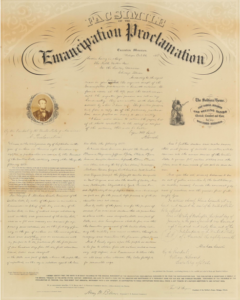As the Civil War violently raged beginning in 1861, America was starkly divided between the North and the South, the free and the slave states. As President Lincoln strived to unite the country once again, he also looked to abolish the tradition of slavery in the southern states. His intentions for universal freedom came to fruition through the Emancipation Proclamation. Lincoln issued the proclamation on January 1, 1863, which declared that “All persons held as slaves within any state of designated part of a state, the people whereof shall be in rebellion against the United States, shall be then, thenceforward, and forever free.”
This document put a final end to slavery in the states and ultimately ensured the Union victory in the Civil War. After this monumental document was introduced, President Lincoln gave the original handwritten proclamation to be displayed in Chicago at the Northwestern Fair in the latter part of 1863. It was then purchased and donated to the Soldiers Home in Chicago where it burned with the building during the Great Chicago Fire of 1871.
Before the fire, numerous copies had been made of the document including the “official” one which is in the collection of the National Archives. Additionally, forty-eight copies were made for the Philadelphia Great Central Sanitary Fair in June 1864 to raise money to improve the conditions for sick and wounded soldiers.
Lincoln made an appearance at the fair and told attendees: “War at its best, is terrible, and this war of ours, in its magnitude and in its duration is one of the most terrible....it has carried mourning to almost every home, until it can almost be said that the ‘heavens are hung in black.’ Yet the war continues....The Sanitary Commission, with all its benevolent labors...[has] contributed to the comfort and relief of the soldiers....The Commission provides voluntary contributions, given zealously, and earnestly, on top of all the disturbances of business, of all the disorders, of all the taxation, and of all the burdens that the war has imposed upon us, giving proof that the national resources are not at all exhausted, and that the national spirit of patriotism is even firmer and stronger than at the commencement of the war.”
The proclamation in the collection of the GHC may well be one of these forty-eight copies and it is reasonable to believe that George Boutwell (whose name is written on the back in his own hand) would have purchased one. | |

Facsimile Emancipation Proclamation lithograph
|